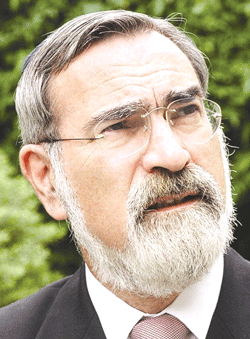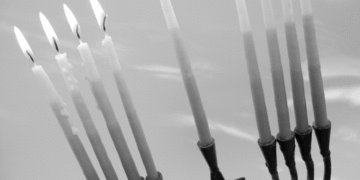Reviewed by NEAL GENDLER
Jonathan Sacks sees the Jewish people today “as divided as it was in the last days of the Second Temple.”
Worrisome stuff from the chief rabbi of the British Commonwealth’s United Hebrew Congregations, its basis seems to be the division between sacred and secular, creating growing disaffection, disaffiliation, intermarriage, assimilation and self-segregation.
In Future Tense, newly out as an economical Schocken paperback, Sacks is stronger on symptoms than cure but says that Jews need to stop turning inward — telling ourselves the world is against us — and turn outward to more fully engage with each other and the world.
In a brilliant prologue, Sacks defines the problem: “Jews are either engaging with the world and losing their Jewish identity, or preserving their identity at the cost of engaging from the world,” with internal divisions making it hard to say we’re one people with a collective identity. Jews “need to recover a sense of purpose,” and “Jewish life needs something more prophetic than crisis management.”
Judaism begins with the universal — God created the world and humans — and moves to the particular: God and Jews have a covenant. Jews needn’t choose between the universal and the particular; Judaism is both.

Rabbi Jonathan Sacks
Sacks explains that the Jewish story began uniquely as one of hope, that history is not circular but linear. The world is not unchanging, and people can improve it and themselves.
“The single most important challenge facing the Jewish people, in Israel and the Diaspora, is to recover the Jewish story,” he says. That story needs to be taught and spread, not through proselytizing but by conversation and good works with others, for Judaism has something to say to all people.
The return to Zion is “one of the most daring and controversial of all Jewish undertakings in the modern age, yet by one of the ironies of Jewish history the achievement… has led to a questioning of the very existence of Jews as a single people.”
He says that in independence, “Jews have found it hard to live peaceably with other Jews,” and refers to the splitting of the 12 tribes into two kingdoms, and the destruction of Jerusalem when the remaining Jews fought each other as well as the Romans.
In exile, Jews remained a people “held together solely by the band of mutual responsibility.” But in our day, he says, we see “one of the more counterintuitive phenomena of Jewish history,” emphasizing in italics: “When it was hard to be a Jew, people stayed Jewish. When it became easy to be a Jew, people stopped being Jewish.”
Jewish peoplehood is strange, he says: “Jews are a nation and Judaism is a religion.” Unlike others, Jews became a nation first, gaining a land later. The covenant was made in the wilderness; the society came first, the state second.
We are “both a religion and a nation, a faith and a fate. Remove either element and it will fall apart.”
Future Tense is beautifully written and easy to read, although a bit diffuse toward the end, where the author explains that Judaism is about relationships and conversation, one in which humans “talk, argue and remonstrate with God… the only civilization whose key texts are anthologies of argument.” But there’s too much argument today, much of it disrespectful, he says. Jews need to listen to each other and to the world, and start increasing their connections.
Being a people that dwells alone “is not a blessing but a curse,” leading to individuals who dwell alone, unable to build and maintain relationships. Such people will fragment into non-communicating sects and parties.
“We need a new generation of Jews committed to the dialog between the sacred and secular if Judaism is to engage with the world and its challenges.”
Yes, Jews have enemies, he says, but we also have friends, “and if we worked harder at it, we would have more.”
***
Neal Gendler is a Minneapolis writer and editor.
(American Jewish World, 8.31.12)



















